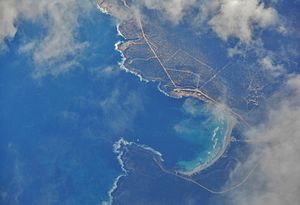Fishery Bay Whaling Station facts for kids
Quick facts for kids Former Fishery Bay Whaling Station |
|
|---|---|
| General information | |
| Type | Whaling station |
| Location | Sleaford, South Australia |
| Country | Australia |
| Coordinates | 34°54′32″S 135°41′05″E / 34.908765°S 135.684613°E |
| Closed | after 1843 |
| Owner | United Fishing Company of Adelaide |
| Designations | South Australian Heritage Register (1982) |
The Fishery Bay Whaling Station was a special place where people used to hunt whales a long time ago. It was located in a part of Australia called Sleaford Bay, near Port Lincoln in South Australia. This station was active in the 1830s and 1840s. It played an important role in the early days of the Colony of South Australia. The station helped the colony by providing one of its first products to sell to other places.
What Was a Whaling Station?
A whaling station was a place on land where people processed whales. After whales were caught at sea, they were brought to the station. Here, their blubber (fat) was boiled down to make whale oil. This oil was very valuable back then. It was used for lamps, making soap, and other products.
A Look Back: Its History
The whaling station at Fishery Bay started operating by late 1837. We know this because a ship called the Siren sailed there. It went to pick up whale oil from the station.
By 1839, a company called the United Fishing Company of Adelaide owned the station. This company was a partnership. It included the South Australian Company and another group called Messsrs Hack and Company.
In 1841, the South Australian Company sold its share. This made the Hack brothers the only owners. But they soon faced money problems. This was during a time when many businesses struggled in the early 1840s. They were declared unable to pay their debts in 1843.
Why Did It Close?
After the Hack brothers faced financial trouble, two new people, Hagan and Hart, bought the station. They also bought another whaling station from the Hack brothers. Hagan and Hart ran the Fishery Bay station for only about three or four months. Then, they decided to close it down. It seems that no more whaling happened at this spot after 1843.
What's Left Today?
Today, experts have studied the area. They have found old building parts and other items. These discoveries show where the whaling station used to be. They help us learn about its past.
The site of the former whaling station is in Sleaford, South Australia. It was added to the South Australian Heritage Register in 1982. This means it's a special historical place that needs to be protected. Before that, in 1972, the land was made a historic reserve. This was done under a law to protect old Aboriginal and historical sites.
 | Victor J. Glover |
 | Yvonne Cagle |
 | Jeanette Epps |
 | Bernard A. Harris Jr. |


